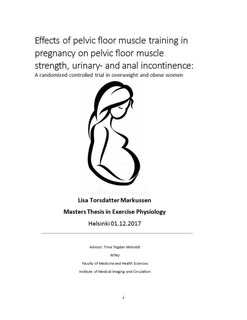Effects of pelvic floor muscle training in pregnancy on pelvic floor muscle strength, urinary- and anal incontinence: A randomized controlled trial in overweight and obese women
Master thesis
Permanent lenke
http://hdl.handle.net/11250/2563081Utgivelsesdato
2017Metadata
Vis full innførselSamlinger
Sammendrag
Background and Aim: Reduction of pelvic floor muscle (PFM) strength is a natural consequence of pregnancy and (vaginal) labor. Urinary and anal incontinence (UI and AI) during and after pregnancy are a commonly reported condition during this period. Overweight and obese women have a higher risk of UI and AI than normal weight women. Pregnancy or postpartum incontinence can become a persistent and bothersome condition for years after the first delivery. The primary aim of this study was to assess if providing a general supervised exercise intervention, including intensive pelvic floor muscle training (PFMT), to previously sedentary overweight and obese pregnant women could affect PFM strength. Secondary aim was to investigate if PFMT could prevent or treat UI and AI in this population group.
Methods: Previously sedentary pregnant women with self-reported pre-pregnancy body mass index (BMI, weight in kg/height in m2) of ≥28 were allocated by 1:1 randomizarion into either a supervised exercise training program including intensive PFMT or standard maternity care. Seventy women (36 in exercise group and 34 in control group) were included for analysis in this sub-study. Assessments of PFM strength were performed by gynecological examinaton and measured with the Modified Oxford Grading System. Symptoms and prevalence of UI and AI were collected by questionnaires at baseline (gestational week 12-18), late pregnancy (gestational week 34-37) and three months postpartum.
Results: No statistically significant differences were observed between the groups PFM strength, prevalence of UI or AI on any of the assessment points. Both groups had no change from baseline strength in either late pregancy or three months postpartum. Prevalences of UI at baseline for the whole study population was 42,8%, in late pregnancy; 52,2% and 3 months postpartum 39,1%. The most commonly reported type of UI vas stress urinary incontinence (SUI). Prevalence of AI at baseline for the whole study population was 41,7%, in late pregnancy 30,2% and 3 months postpartum 35%. The PFMT intervention reduced UI severity in late pregnancy.
Conclsion: Providing a supervised exercise intervention with focus on intensive PFMT to previously sedentary overweight and obese pregnant women did not affect PFM strength or prevalence of UI and AI in late pregnancy or postpartum, when compared with standard materal care.
